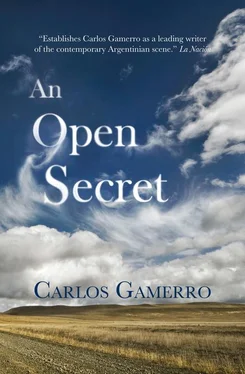Carlos Gamerro - An Open Secret
Здесь есть возможность читать онлайн «Carlos Gamerro - An Open Secret» весь текст электронной книги совершенно бесплатно (целиком полную версию без сокращений). В некоторых случаях можно слушать аудио, скачать через торрент в формате fb2 и присутствует краткое содержание. Год выпуска: 2013, Издательство: Pushkin Press, Жанр: Современная проза, на английском языке. Описание произведения, (предисловие) а так же отзывы посетителей доступны на портале библиотеки ЛибКат.
- Название:An Open Secret
- Автор:
- Издательство:Pushkin Press
- Жанр:
- Год:2013
- ISBN:нет данных
- Рейтинг книги:5 / 5. Голосов: 1
-
Избранное:Добавить в избранное
- Отзывы:
-
Ваша оценка:
- 100
- 1
- 2
- 3
- 4
- 5
An Open Secret: краткое содержание, описание и аннотация
Предлагаем к чтению аннотацию, описание, краткое содержание или предисловие (зависит от того, что написал сам автор книги «An Open Secret»). Если вы не нашли необходимую информацию о книге — напишите в комментариях, мы постараемся отыскать её.
is a compelling postmodern thriller confronting guilt, complicity and the treachery of language itself. Dario Ezcurra is one of the thousands of Argentinians unlucky enough to be 'disappeared' by the military government-murdered by the local chief of police with the complicity of his friends and neighbours. Twenty years later, Fefe, a child at the time of the murder, returns to the town where Dario met his fate and attempts to discover how the community let such a crime happen. Lies, excuses and evasion ensue — desperate attempts to deny the guilty secret of which the whole community, even Fefe himself, is afraid.
An Open Secret — читать онлайн бесплатно полную книгу (весь текст) целиком
Ниже представлен текст книги, разбитый по страницам. Система сохранения места последней прочитанной страницы, позволяет с удобством читать онлайн бесплатно книгу «An Open Secret», без необходимости каждый раз заново искать на чём Вы остановились. Поставьте закладку, и сможете в любой момент перейти на страницу, на которой закончили чтение.
Интервал:
Закладка:
“YOU KNOW WHAT SHE USED TO SAY, our Delia, when she was asked about her son’s reputation? That he gave her a grandchild in every town,” Auntie Porota told me the other day. “Please, Delia’d say, they’re grandchildren of the ones who never taught their daughters how to get to the altar with their legs crossed. How’s it the boy’s fault if the young girls nowadays can’t behave any better than the chinitas . Oh good gracious me that Delia, terrible she was, woe betide you if crossed her, with that sharp tongue of hers, and they wonder why the lad turned out the way he did, like mother like son I say, don’t you agree Fefe?”
“THAT WOMAN WASN’T MY GRANDMOTHER,” I’d blurt out indignantly, choking on the pasta soup — Little Stars № 16—that Celia had brought me in bed. “My grandmother’s name is Emily Bullock de Echezarreta, she lives in Rosario and she welcomed me into her house— this house — every summer. The other one, three months of every year living three blocks away and not once, not once … She knew who I was, and she thought it was … amusing. Her son went from one town to the next knocking up young girls, wham bam thank you ma’am, and she thought it was funny! You heard what she used to say,” I inveigh from an imaginary pulpit.
“What they say she said Fefe,” Celia corrects me sweetly. “If you don’t learn to listen with your heart as well as your ears in this town, you’ll never understand. Darío was eighteen when he was courting with your Mamá, he was a boy. And I don’t for a minute think Delia knew that you … Your grandparents kept the secret very well, and I … I know I never told a soul. And if she did know, if Darío did tell her … She’d begun to change; over those days she changed more than a lot of people do all their lives. If they’d let her live, she’d’ve come to love you. In you she could’ve regained something of the son who’d been taken from her. After everything you’ve been told, can’t you see it couldn’t be otherwise? She’d be a totally different person now. But they didn’t give her time Fefe.”
“WHAT YOU HAVE TO BEAR IN MIND, dear boy, if you want to get to know the mentality of the man who killed your father,” Professor Gagliardi says to me, manoeuvring his open dressing gown through the piles and shelves of books that make his house a maze, “is that all his life he’d been nothing but a provincial policeman, whose experience in matters of murder went not much further than the odd working over that got out of hand, the unwitting heart patient victim who didn’t tell them about his condition before getting the picana , the successful crook who forgets to pay their cut and remembers in the hereafter. Neri belonged to the old school of concealment — covering your tracks, cooking the files, striking pacts with judges and coming to arrangements with lawyers. He thought you should at least keep up appearances. He was too naive then, as were most of us — he thought people’s natural reaction to an imminent crime would be to stop it, or report it. His need to lie paradoxically reveals his faith in people. It never entered his head that the perfect crime is precisely the one committed in the sight of everyone — because then there are no witnesses, only accomplices. His premise was correct — in a two-bit town like this you can’t waste a prominent inhabitant without everyone knowing: because it only takes one person to find out for everybody to know. He mistakenly concluded that, in the face of such vigilance, impunity wasn’t an option. Of course it wasn’t, as certain distorters of public opinion repeat ad nauseam, because the policemen of his generation had notions of morality, honesty or honour that were later lost; no, it was simply narrow-mindedness, intellectual laziness — a eureka moment, a Copernican revolution, the Superintendent was simply too old for. All he needed to arrive at the right solution was a leap, a flip of the imagination that stood logic on its head and set the clockwork going — the realisation that you can hold your tongue while talking out loud, that town gossip can work the other way round. That silence also travels by word of mouth.”
CELIA TAKES ANOTHER PHOTO from the box.
“And this must’ve been, let’s see hold on, I bought that sundress … Can’t be long after your mother left, that summer … Who knows maybe you’re in the photo too? It doesn’t bother you if I say it does it Fefe?”
In the photo are Celia and my mother, the former in a dress blown tight against her body by a wind the photo has captured for ever in sculptural folds; the second — Mamá—in a one-piece, navy-blue bathing costume with white bows and little flounces, which she was still wearing ten years later; and in the middle Darío Ezcurra, democratically embracing them both. Celia and Darío are looking at the camera, but Mamá only has eyes for him, for the almost condescending smile, for the boastful eyes of a kid staring the future fearlessly in the face because life is definitely female, for the bronzed chest and flat stomach above the scarlet trunks — the only thing in the photo (including the sky and the water of the unmistakeable lagoon) that hasn’t faded to the uniform sepia of old Kodacolors. I set it on the uneven stack forming at the side of my bed, documenting Ezcurra at his high-school graduation in an ill-cut suit that narrows his shoulders, dancing with a youthful, spellbound Clara Benoit; Ezcurra in black polo neck and brown jacket with a lean Batata Sacamata and an undyed Bermejo, posing by farming machinery and stands under construction, beneath a poster that reads EXPOTENC ; Ezcurra blowing out the thirty — Celia specifies — candles in the reception room at the Yacht Club; Ezcurra and his Mamá, wrapped up warm for winter, having chocolate and churros at the bazaar on patron saint’s day; Ezcurra in bermudas and multicoloured polo shirt with Celia and the Don Ángel of my childhood keeping an eye on the sausages on the barbecue of the house that now belongs to Mati … Celia insists I keep them and I’m still too weak to argue — a meagre haul, something to show when I’m asked “What have you been up to in that town all this time … What did you say its name was?” What else? Or did the hope of winning the ultimate prize still nestle within me, secretly, ashamed to show itself? Ezcurra’s last words, before dying: “My son, my son” (yes, but which one?). A secret meeting, in Rosario, my Grandma Delia telling my Grandma Emily (perhaps in English for security’s sake): “We have to discuss our grandson’s future.” Wasn’t this what I was still hoping for, what I’d really come here to look for? Wasn’t it for this hope that I’d kept putting off my return?
“I DO APOLOGISE,” Professor Gagliardi says without looking at me, which he’s hardly done since we began our chat. If it weren’t for the additional cup and the sugar bowl, which, out of deference to my dislike of saccharine, he’s brought over to the chair that serves as a makeshift table, he might be talking to himself, and answering his own questions, “for not seeing you sooner. Had I known who you were, I would have opened the doors of my humble abode to you from day one, sparing you the gruelling task of rubbing shoulders with that filthy, lying rabble in your brave quest for the truth. I understand dear boy, there’s no need for you to explain, you were right to conceal your true identity, if they’d known you were Darío Ezcurra’s son, every door would have been slammed in your face. What’s more, this way you’ve been able to see for yourself that everything I’ve been telling you about the people of this town is true. Now, I’m glad you’re here. Because twenty years is too long to bear the weight of such a secret. Many times, fearing I’d take it with me to the grave, I’ve been on the brink of succumbing to the temptation … But to whom? Who in this town, was or is worthy of knowing the truth? Now, I’m glad I waited, now that you’re here in front of me, and through your own, I can remember the unmistakeable features of your unfortunate father, when he died he must have been around your … See dear boy? I’m seldom wrong. That’s why you came to me isn’t it? So that I’ll show you the key to the apparently inexplicable doings of Malihuel’s chief of police, who against all logic, against the deep-seated habits of his profession, even against his own interests … I know what no one knows, because I heard it from his own lips, in the only conversation we had after those terrible events, a few days before his departure, in the name of our old relationship, Benjamín, he had the audacity to say. I didn’t have the nerve to refuse. Ethics and let’s call it professional curiosity were at odds in me, and curiosity won. I also needed to know, needed it for myself, how a man I’d once trusted had been capable of such a thing; I wanted to know where I’d gone wrong. We met at Los Tocayos, at the table where we used to play chess and called ours. It was no more than two weeks since we’d last met, but it was enough time to have changed him irreversibly. He was no longer fit for anything other than setting up a kiosk and dying — which is what he eventually did — for keeping order among the shelves of chocolates and biscuits; a defeated body, barely sustained from morning till night by the habit of contempt and ill feeling, and the secret hope perhaps that some hapless robber would hold up his kiosk and force him to use the forty-five hidden under the cigarette cartons. I don’t know if you’ve heard of Colonel Carca, Demetrio Carca. There’s no reason you should: house-plunderer, kidnapper and blackmailer, torturer, rapist, serial killer, thief of babies and corpses — nothing special; just your run of the mill career soldier in those days. They were from the same town in the north, the Superintendent and he, they grew up and went to school together, and remained friends. He was the one who called the Superintendent from Rosario and demanded he indulge Rosas Paz. The Superintendent said it couldn’t be done — because of the people, the neighbours; the colonel, who was an old hand in these matters, said it’d be a piece of cake. All done in a joking, matey tone of voice, you know how they talk to each other, all comrades in arms: Go on, you fat wanker, shift your arse and pick him up for me will you, and the other, You think it’s as easy as that? If you’re the big man here, why don’t you come and do it? One thing led to another, and eventually to what the Superintendent ended up confessing to me that day.”
Читать дальшеИнтервал:
Закладка:
Похожие книги на «An Open Secret»
Представляем Вашему вниманию похожие книги на «An Open Secret» списком для выбора. Мы отобрали схожую по названию и смыслу литературу в надежде предоставить читателям больше вариантов отыскать новые, интересные, ещё непрочитанные произведения.
Обсуждение, отзывы о книге «An Open Secret» и просто собственные мнения читателей. Оставьте ваши комментарии, напишите, что Вы думаете о произведении, его смысле или главных героях. Укажите что конкретно понравилось, а что нет, и почему Вы так считаете.












